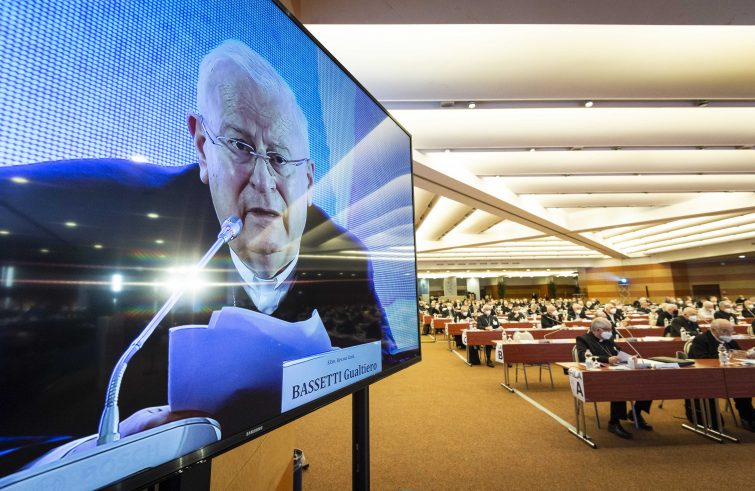
“Our rich history testifies to the fact that synodality – style, method, and journey – is consistent with a process that spans five decades, especially in light of the awareness of the ‘change of epoch’ taking place”. In his opening speech for the 74th General Assembly of the Italian Bishops – underway at the Hotel Ergife in Rome until May 27 – Card. Gualtiero Bassetti, Archbishop of Perugia-Città della Pieve, President of the Italian Bishops’ Conference (CEI), gave a comprehensive description of the history of the Italian Church, starting from the first general assembly and extending to pastoral plans and ten-yearly conferences. “As it was in the early Seventies, the Italian Church is called today to engage in a discernment effort leading to conversion, communion and co-responsibility”, he said on behalf of the Italian Bishops’ Conference, addressing “an affectionate and devout thought to Pope Francis, who inaugurated the Bishops’ meeting yesterday. “Our responsibility today is to devise renewed models,” Bassetti explained:
“The Church in Italy – our Church, our Churches – has never been and will never be in opposition to Peter,
to His Magisterium, to His Word. Hence, today, as it has always been throughout the course of our history, we feel called to live out synodality, to embark on a synodal journey.” It is a journey, not a mere event, “for it concerns the type of Church we are called to by the Holy Spirit, especially in the present times.”
Therefore, the challenge ahead of the bishops is to “develop synodal paths that reflect the experiences and peculiarities of our ecclesial communities, thereby contributing to the growth of a Church whose faces reflect the features of our proud history and histories, experiences and skills, along with the diverse realities of our faith communities, our charisms and ministries, poverty and riches.” “It is a style that requires making a number of choices with a view to embodying the concrete manifestation of the pastoral conversion urged upon us by Pope Francis,” the Cardinal said. “This style recognises the primacy of the human person over structures, as well as promoting cross-generational dialogue, trusting in the co-responsibility of all ecclesial subjects, enhancing and harmonising community resources, bravely refusing to be conditioned by the idea that ‘this is the way it has always been done’, and embracing service to humanity in its entirety as its horizon. We are being asked to change course. The various stages of the ‘journey’ will enable us to become familiar with this style, leading it to permeate the daily life of our ecclesial community.” For the President of the Italian Bishops’ Conference, the first step is an “extended and inclusive ecclesial ‘us’“: “an ecclesial ‘us’ that fosters mutual understanding among believers”, a “journey of the people” requiring “the shared responsibility of all”, including lay faithful and all those “involved in the cultural, political and economic spheres.” “Ecclesial reconciliation” is needed, along with “reconciliation with the world”, which translates into empathy: no to extremism and violence, yes to “bridges of understanding with all”.
His Eminence referred to the demographic winter as a top priority for policy-makers,
that must be countered via “fiscal and administrative measures, such as the single allowance currently being made available to all categories of workers, and active labour policies, especially for women, respectful of family time and childcare.”
As regards the “Zan bill”, the Italian Bishops’ Conference stated: “We reaffirm our availability to ‘an open dialogue’ aimed at reaching a solution devoid of ambiguities and forced interpretation of the law.”
“No more deaths at work!” the cardinal exclaimed, urging “that measures be taken to ensure safe working conditions.”
The National Plan for Recovery and Resilience (NRRP) holds “great importance”, and it represents “a major opportunity for collective growth”,
said the President of Italian bishops. “May wisdom be shown in involving all the positive, numerous, and yet scattered energies of the country,” is the hope expressed by the Italian Church, according to which the NRRP “can serve as an opportunity to relaunch the country’s economy, giving respite and relief to a society tried by a prolonged health crisis, with extremely serious consequences on the socio-economic system.” In fact, according to data released by Caritas, from September 1, 2020 to March 31, 2021, almost one in four people (24.4%) will be among the “new poor”. As many as 453,731 new poor people have sought Caritas assistance over the past pandemic year.
On the international level the Bishops join the Pope’s heartfelt appeal that “the clamour of arms be stopped in every conflict area – in the Holy Land in particular- and that the path of dialogue and reconciliation be resumed.”
With regard to migratory phenomena, the Italian Bishops’ Conference, through its national offices, has ensured the safe arrival in Italy and reception of over one thousand refugees from the Middle East and Africa.
“This shows that there is an alternative to illegal immigration routes and to deaths at sea.”
Recalling the meeting in Bari in 2020, Cardinal Bassetti made known that the Bishops are in the process of identifying another similar initiative aimed at transforming the Mediterranean in a Sea of peace.











